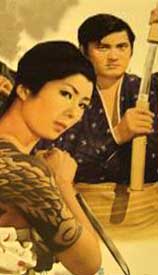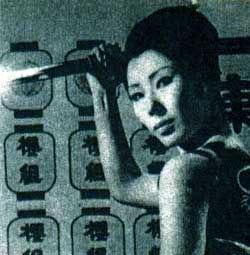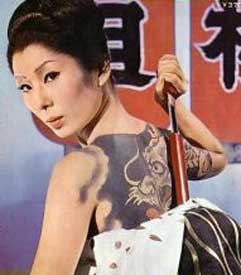Director Teruo Ishii is responsible for a truly mixed bag of films. He has a cult following for stylish "pinku" films which mix violence & sex & torture, including Female Yakukza Tale: Inquisition & Torture (Yasagure anego den: Sokatsu rinchi, 1973) & his "Joys of Torture" series beginning with Punishment of the Tokugawa Women (Tokugawa onna keibatsu-shi, 1968).
But at the same time he's responsible for some very well done ninkyo eiga (chivalrous yakuza films) such as in the Abashiri Prison series starring the commanding yet sensitive Ken Takakura, & one of the most stunning of all chivalrous woman-yakuza films, The Red Silk Gambler (Hichirimen Bakuto, 1972).
Earlier in his career he directed some childish science fiction films so awful they're great fun, including the "Super Giant" series of the 1950s, which were Englished for American television & still in circulation.
What he almost never is is tasteful, yet you can tell he could've been a classic director if he'd had different commercial pressures. More tasteful than the majority of his output was The Friendly Killer aka Rising Dragon Iron Skin (Nobori-ryu tekka-hada, 1969).
 The Friendly Killer comes very close to serious-minded, an onna-ninkyo or chivalrous woman film that has largely fallen off the map after it's initial runs & second-runs & third-runs in ethnic theaters of the 1970s. The Friendly Killer comes very close to serious-minded, an onna-ninkyo or chivalrous woman film that has largely fallen off the map after it's initial runs & second-runs & third-runs in ethnic theaters of the 1970s.
I suppose that old subtitled film print shown at the now defunct Kokusai Cinema in Seattle is long worn out & faded. If so the only way the film will resurface now is if it turns up subtitled on Hawaiian television & gets copied by pirateer dvd distributors; or, with better luck, gets remastered with removable subtitles for honest distribution. Given the continued following for Teruo Ishii films, it shouldn't be a financial gamble to get it onto dvd.
It starred the tough & beautiful Hiroko Ogi as the oyabun or gamblers' boss Katskui Sakura. Hiroko seems not to have had much of a film career, though she had a brief cache at Nikkatsu Studios circa 1969-1970, a time alas when the film industry in Japan was in upheaval & new stars were unlikely unless on television shows.
She had her closest brush with success with a role in Ko Nakahira's Yami no naka no chimimoryo (Chimimoryo: A Soul of Demons, 1971) with a script by Kaneto Shindo (director of Onibaba). This film debuted in Europe at the Cannes Film Festival.
She'll also be spotted in Meijiro Umezi's Junjo nijuso (Lovers's Duet, 1967) starring Chieko Baiso, & Akinori Matsuo's Taka to Okami (The Eagle & the Wolf, 1968) starring Hideki Takahashi. But that's about it.
 The plot of The Friendly Killer is as old as they come, so it's the style (with that Teruo Ishii touch of elegant seediness or sexploitation not overdone) & the screen presence of Hiroko that makes the film effective. The plot of The Friendly Killer is as old as they come, so it's the style (with that Teruo Ishii touch of elegant seediness or sexploitation not overdone) & the screen presence of Hiroko that makes the film effective.
Her character Katsui becomes onna-oyabun or woman-boss after her father is murdered. She has a full back & right arm (the sword arm) tattoo of a "rising dragon" & when she has to fight big-time in the climax, she slips her shoulders out of her kimono for better movement with sword, & to reveal her ferocious tattoo.
Unlike most such characters she elects not to set out on the road of vengeance. For her gang members' sake she strives to bring about peace between her gang & the Yasukawa gang.
Even against her preferences the rival oyabun (Toru Abe) just can't be trusted, & she is cornered into a killing. While in prison, her response to some of the exploitation "women behind bars" events is to organize women for better conditions.
Upon release she discovers Abe has taken over her gambling territory. Assisted by Masa, the tale will culminate in their one-woman & one-man raid against the vile oyabun Yasukawa & all his men.
Masa is played by one of Nikkatsu's bigger stars, Akira Kobayashi, in the mode of the classic ninkyo-eiga chivalrous gambler. Kobayashi had a stellar running record of genre films, including leading man in the "women police" series (1969-1970) on which he was also a producer, & appearances with Bunta Sugawara in Kinji Fukasaku's two classic nihilistic gangster series Yakuza Papers (1973-1974) & Battles Without Honor & Humanity (1973-1984), as well as Seijun Suzuki's Kanto Wanderer (Kanto mushuki, 1963).
He also starred in a film that truly transcended the yakuza genre, Gate of Youth (Seishun no Mon, 1975) as the oyabun Goro with whom Shinsuke (Ken Tanaka) falls in love.
Since girl gangsters just about never get to live happily ever after in these sorts of films, Masa will not survive the raid, but has atl east redeemed himself of the sorrowful secret of having been the man Yasukawa hired to kill her father.
It seems probable that like so many one-off yakuza films of the late '60s early '70s this was intended as the first of a series had box office receipts for just about all films not been falling off so drasticly. Instead it turned out to be the apex of Hiroko Ogi's short film career. She deserved better.
copyright © by Paghat the Ratgirl
|


